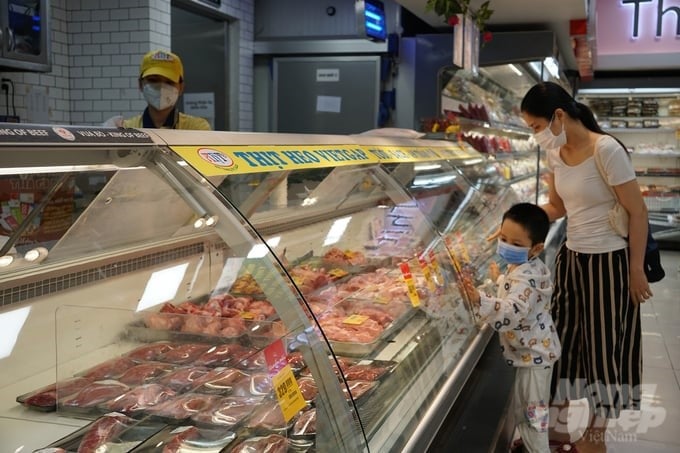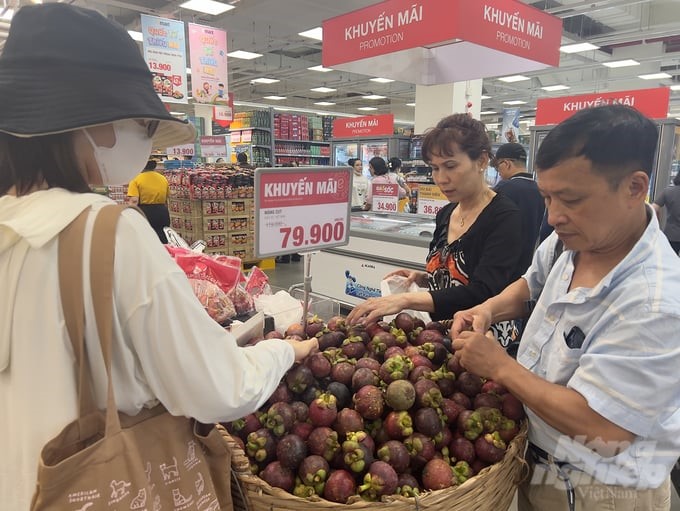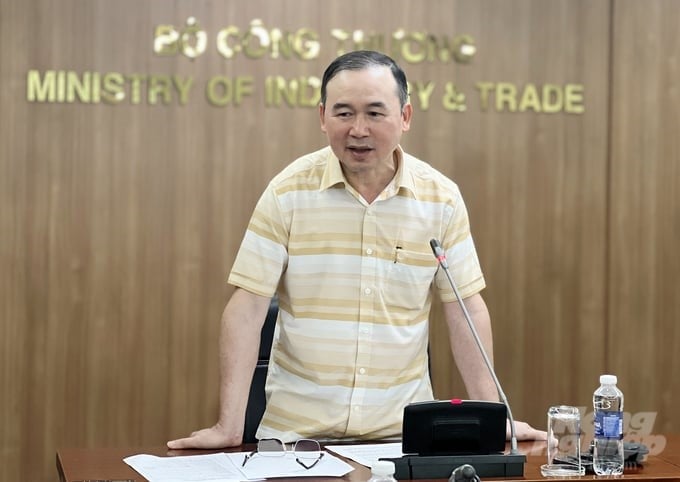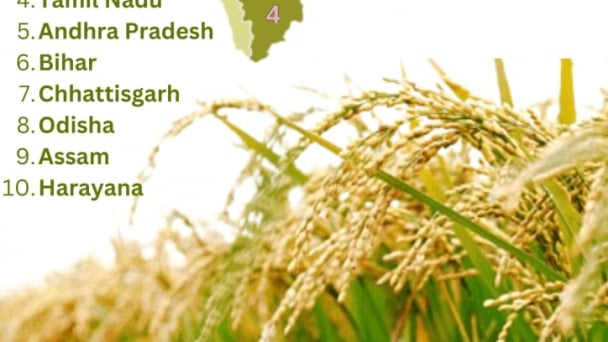June 22, 2025 | 10:52 GMT +7
June 22, 2025 | 10:52 GMT +7
Hotline: 0913.378.918
June 22, 2025 | 10:52 GMT +7
Hotline: 0913.378.918

Consumers tend to choose healthy foods. Photo: Nguyen Thuy.
At the working session with a number of industry associations, businesses, and retail systems in the Southern region on August 10, Mr. Phan Van Chinh, Director of the Domestic Market Department under the Ministry of Industry and Trade, said that the domestic market of 100 million people has huge consumption power. "This is our battleground. If we do not have solutions to promote domestic trade, we will not be able to take advantage of this opportunity," said Mr. Chinh.
At the working session, associations, businesses, and retailers all assumed that businesses currently continue to face many difficulties and challenges when logistics and raw material costs increase highly and competition is increasingly fierce. Meanwhile, consumption tends to decrease, and consumers' consumption behavior is changing, mainly focusing on essential consumer goods, fresh foods. In particular, consumers tend to choose organic products, green products, and healthy products.
Therefore, each business and retailer have to offer their own solutions to get good, quality products at affordable prices, promotion programs, etc. to stimulate consumption and provide products that suit consumer tastes. In addition to that, there needs to be the companionship of Ministries, branches, and localities, especially in the issue of deploying large, concentrated raw material areas locally to facilitate the purchase of large, stable sources of uniform quality, particularly agricultural products and OCOP products.
In fact, in recent times, the production scale of localities has increased, but the commercial scale and market demand are still small, making it difficult for manufacturing businesses to bring goods to distributors. Meanwhile, distributors have difficulty in terms of finding sources of goods to purchase.
Retailers recommend that each locality needs to have a unit (business) to act as a focal point, gathering typical agricultural products and OCOP products of the locality. Thereby reducing logistics costs, controlling product quality, and helping retailers conveniently purchase goods to distribute to domestic and foreign consumers.
Regarding the purchase of fresh products, Mr. Trinh Quang Khai, Legal Director of Bach Hoa Xanh, said that the unit is having difficulty with the supply of these products. Therefore, the unit wishes the provinces to focus on supporting farmers to produce quality products so that retailers can purchase quality products from each locality.

Retail systems wish to purchase localities' quality agricultural products in large quantities to serve consumer needs. Photo: Nguyen Thuy.
According to Ms. Nguyen Thi Ngoc Hue, Director of External Relations at Aeon Vietnam, to get good prices for products throughout the system, serving domestic consumers, the unit has linked with manufacturers and signed contracts with a certain quantity and commitment to consumption amount. Besides, cooperate with local manufacturers to make private-label products according to Aeon's standards.
Ms. Hue added that in addition to consuming fresh agricultural products, Aeon also packages and freezes them to be able to consume agricultural products in large quantities. In particular, 2023–2024 is the time when Vietnamese agricultural products made a reputation in the Japanese and Hong Kong markets. Of which, Long An bananas have replaced all Philippine bananas at Aeon's system in Hong Kong.
Aeon Vietnam representative said that in order to not only meet the increasingly strict standards of domestic consumers but also meet high-end foreign markets, Vietnamese manufacturers also need to aim for green products. "All of Aeon's green products are sought after by buyers in Hong Kong and Singapore," shared Ms. Hue.
According to Ms. Huynh Bich Thuy, Director of the Supplier Relationship Development Department of Ho Chi Minh City Union of Trading Cooperatives (Saigon Co. op), in recent times, Ministries, branches, and localities have done very well in supporting supply and demand connection. However, there needs to be a policy to support businesses and cooperatives with small-scale production to participate in long-distance supply-and-demand connections instead of "fighting once and stopping" when they do not have enough funding, resources, and experience.

Mr. Phan Van Chinh, Director of the Domestic Market Department under the Ministry of Industry and Trade, said that the Ministry is now collecting comments on the draft Project "Stimulating domestic consumption, promoting domestic trade," focusing on long-term solutions to promote the domestic market and support exports.
"The Ministry of Industry and Trade focuses on solutions such as developing sources of goods; taking the domestic market and using associations, businesses, wholesalers, and retailers to orient domestic production.
Determining distribution and logistics stages are very important stages, helping to connect manufacturers with wholesalers and retailers and bring goods to consumers. Logistics costs account for a very high proportion of distribution activities. If the distribution and logistics stages are well organized, goods can be produced on a large, commercial scale," Mr. Chinh said.
Translated by Thu Huyen

(VAN) Last week, the U.S. Department of Agriculture (USDA) released its June World Agricultural Supply and Demand Estimates (WASDE), raising projections for both Indian rice production and U.S. rice imports for the 2025/2026 marketing year.
/2025/06/17/2344-1-131758_261.jpg)
(VAN) Amid tariff risks and growing trade barriers in the U.S. market, Australia is emerging as a promising destination to sustain the growth momentum of Vietnam's shrimp exports.
/2025/06/17/2013-1-nongnghiep-112009.jpg)
(VAN) This notable growth trend reflects the global taste for fresh, nutritious fruits and the expanding use of lychees across various sectors.

(VAN) The political and cultural insulation of Japan’s beloved grain is falling apart, and experts warn the country’s relationship with the staple will have to adapt.

(VAN) Noting risks, report examines impacts of avian influenza, changing trade patterns since 2022, fish fraud, and shipping industry’s net-zero goals.

(VAN) Mr. Tran Quang Bao, General Director of the Forestry and Forest Protection Department, met and worked with the International Wood Products Association to promote cooperation in the field of timber trade.

(VAN) China's outbound shipments of rare earths in May jumped 23% on the month to their highest in a year, though Beijing's export curbs on some of the critical minerals halted some overseas sales.